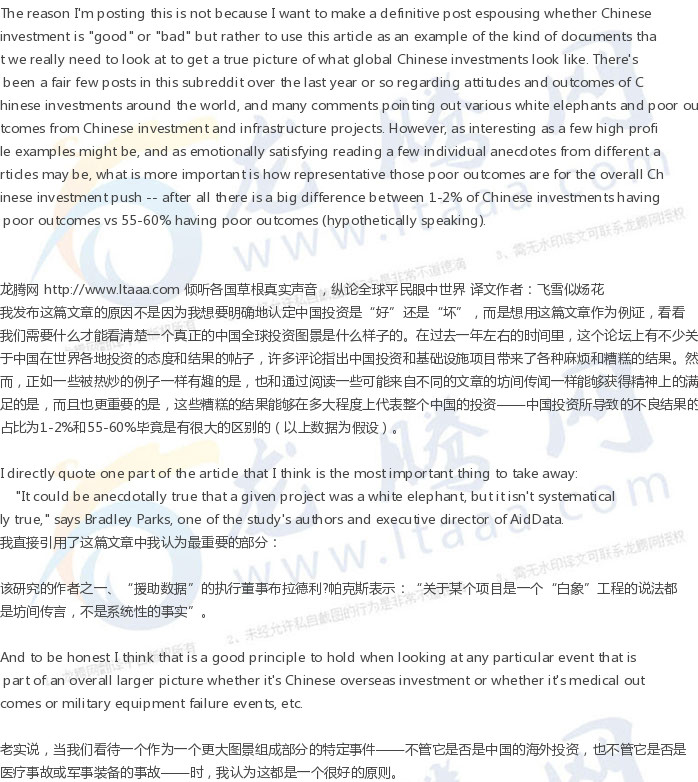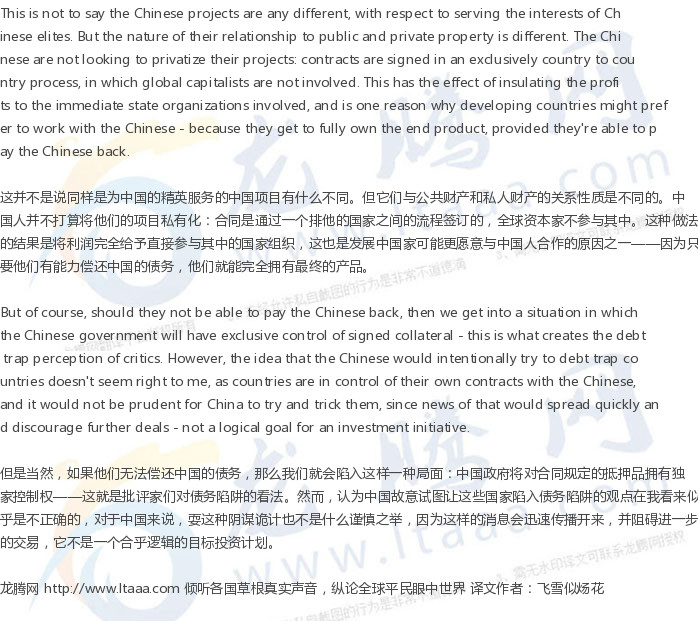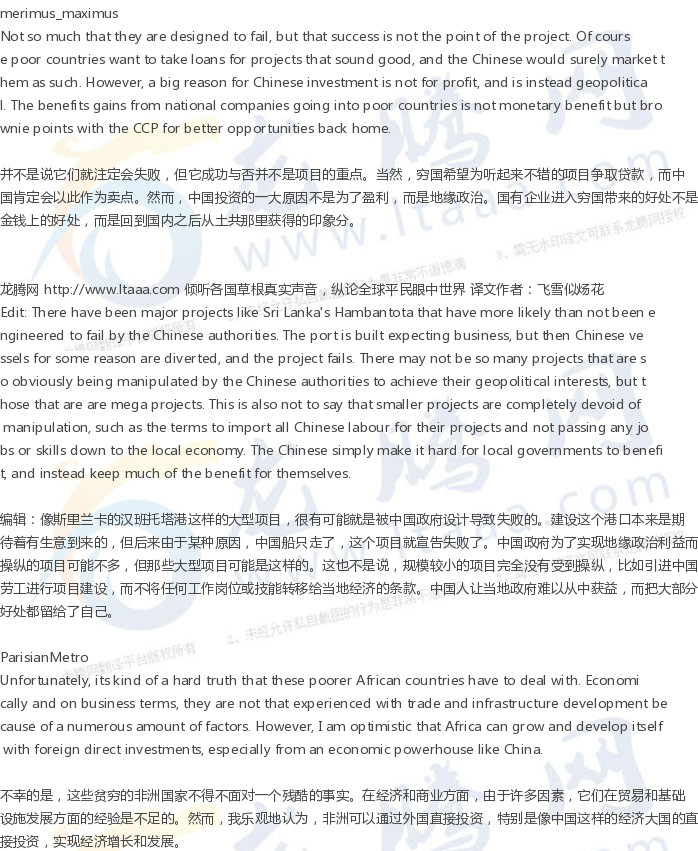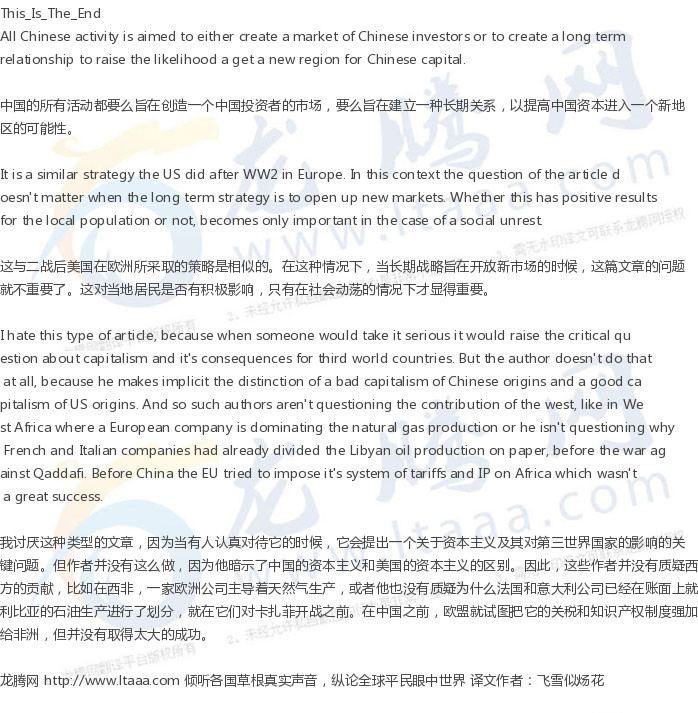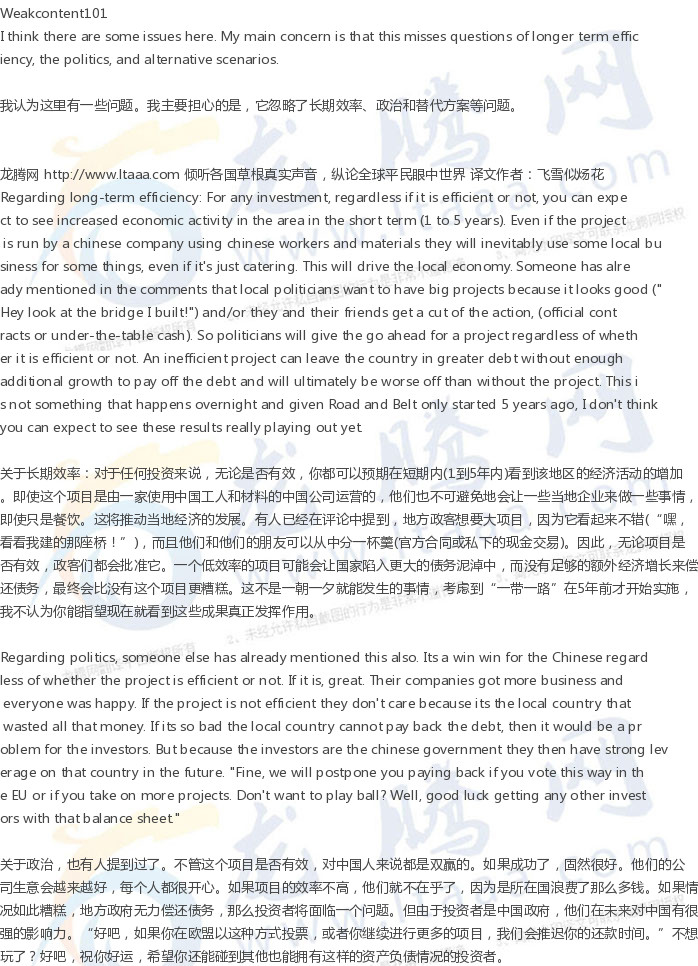【评论】中国的建设项目帮到贫困国家的经济了吗? [美国媒体]
reddit网友:美国国家公共广播电台的这篇文章关注了研究机构“援助数据”最近所做的一些研究,这些研究试图确定中国投资对当地经济产出和经济平等所产生的影响,他们主要是通过测量可见光这个变量的发展。这项研究的结果表明,夜间照明的卫星图像......
China's building spree in poor nations: Does it really help the local economy?
中国的建设项目帮到贫困国家的经济了吗?
PLArealtalk
SS: this article from the NPR looks at some recent research done the research group AidData, that tries to ascertain the effect of Chinese investment on local economic outcomes and economic in/equality, primarily through measuring light as a variable. The findings from the study -- which can be found here -- suggest that satellite nighttime imagery of lighting (as an often used indicator of household income) appears to geographically correlate with various Chinese infrastructure projects (worth reading the full paper for the methodology). The article and study does mention that additional research would be useful to further account for any confounding variables, as well as to investigate the longevity of various economic outcomes, as well as suggesting that more in depth research in those communities (qual research it sounds like) would be useful.
美国国家公共广播电台的这篇文章关注了研究机构“援助数据”最近所做的一些研究,这些研究试图确定中国投资对当地经济产出和经济平等所产生的影响,他们主要是通过测量可见光这个变量的发展。这项研究的结果表明,夜间照明的卫星图像(作为家庭收入的常用指标)似乎与中国的各种基础设施项目存在着地理位置上的关联。这篇文章和相关研究确实提到了更多的研究将有助于进一步阐明任何会混淆的变量,研究各种经济成果的维持时间,同时还认为对这些社区进行更深入的研究也将是有用的。
Statistics matter, and right now I don't think there is enough of this kind of research to give us an overall, systematic picture of what the Chinese overseas investment looks like, in both a qualitative and quantitative way.
统计数据很重要,我认为目前还没有足够的这类研究从定性和定量两方面全面系统地阐述中国海外投资的情况。
HigherMeta
There are a couple of key observations from the article that I think should be paid closer attention:
Often, it's cheaper and faster to work with China than with traditional donors, like the World Bank, and it comes with fewer strings attached, such as requirements to privatize the project once it's built.
这篇文章中有几个我认为应该引起更密切关注的关键观点:
通常情况下,与中国合作比与世界银行等传统捐助方合作更便宜、更快,而且附加的条件也更少,比如项目建成后的私有化要求。
We've all known that working with China leads to less strings being attached than Western development institutions like the World Bank, but what those strings are is often left out. Now we have one definitive answer: a requirement to privatize. This goes in hand with what I've said before about the nature of the market capitalist system and the West's role in it: by requiring infrastructural projects to privatize, organizations like the World Bank can ensure that whatever it builds, contributes to preserving the status quo, in which global capital flows from and returns to the hands of the incumbent rich, who have the financial ability to invest in and own the profits from these enterprises.
我们都知道,与中国合作所附带的条件比世界银行等西方发展机构要少,但这些附加条件往往被忽略了。现在我们有了一个明确的答案:那就是要求私有化。这与我之前所说的关于市场资本主义制度的性质和西方在其中所扮演的角色是相吻合的:通过要求基础设施私有化的项目,如世界银行这样的组织可以确保无论它建造了什么,都有助于维持现状,在这种现状中,全球的资金流都是来自并最后返回现在那些拥有投资能力并从这些项目中获得利益的富人手中。
In all, I think this is an excellent illustration of the differences in geopolitical approach between China and the West, and how by insisting on government to government relationships without the intervention of global capitalists, there is a clash of fundamental interests.
总之,我认为这很好地说明了中国和西方在所采取的地缘政治方法上以及如何在没有全球资本家干预的情况下坚持政府对政府的关系上存在的差异,两者之间存在着根本上的利益冲突。
i_already_forgot
after all there is a big difference between 1-2% of Chinese investments having poor outcomes vs 55-60% having poor outcomes (hypothetically speaking).
“毕竟,中国投资所导致的不良结果的占比为1-2%和55-60%毕竟是有很大的区别的(以上数据为假设)”
The idea that Chinese investment is designed to fail is utterly ridiculous in the first place. Not only does it not make logical sense, it is disrespectful to the poor countries that take them. Like they don't have accountants or economic advisors who could tell them a bad loan when then they see one. It relies on the audience totally believing that the supposed victims are completely incompetent and helpless. I'd chalk it up to a lingering byproduct of imperialism if it weren't so obviously a case of willful ignorance.
认为中国的投资注定要失败的想法从一开始就是非常荒谬的。这不仅不合逻辑,而且是对穷国的不尊重。就好像它们没有会计师或经济顾问似的——当他们看到不良贷款时,他们可以告诉这些国家。它依赖于观众完全相信所谓的受害者是完全无能和无助的。我认为这是帝国主义挥之不去的副产品,如果这不是故意表现出来的无知的话。
Mediumcomputer
I was hoping someone would cite this. It’s not that the loans are designed to fail but that the countries that take them can’t grow enough to pay them back thus forfeiting valuable land and resources to the loaner country
我希望有人能引用这个观点。问题不在于贷款就是意在失败,而在于贷款的国家的经济无法增长到足以偿还贷款的程度,最终它们不得不将宝贵的土地和资源拱手让给贷款国。
_wsgeorge
Like they don't have accountants or economic advisors who could tell them a bad loan when then they see one.
“就好像它们没有会计师或经济顾问似的——当他们看到不良贷款时,他们可以告诉这些国家”
I'm in one of those "poor countries" you mention, and I can tell you that a lot of us feel like we don't have people who can spot a bad loan from a mile. Unfortunately I'm no expert in this (my interest is now growing in this area) so I can't make the judgement for myself.
我身处你提到的那些“穷国”之一,我可以告诉你,我们很多人都觉得我们中没有人能从一英里外就能发现不良贷款。不幸的是,我不是这方面的专家(我对这方面的兴趣正在增加),所以我不能自己做出判断。
my_peoples_savior
thanks for the optimism.
谢谢你的乐观。
leeyuuh
If you are interested in the data, I suggest you look into the research being done by the people at John Hopkins School of International Relationss China-Africa Project, especially Deborah Braumingtn, who often takes a finance/accounting number crunching approach combined with on the ground research. They are also more "inside" the issue, as they actively attend forums and are part of China-Africa circles, in Africa. They do tend to take a more country to country approach (argueably more useful than one continent, one summary).
如果你对这些数据感兴趣,我建议你去看看约翰霍普金斯大学国际关系学院中非项目的研究人员的研究成果,尤其是黛博拉·布劳明恩,她经常采用金融和会计数据处理方法,并结合实地调查得到一些结果。他们也更“深入”地演技了这个问题,因为他们积极参加各种论坛,是中非圈子中的一员。他们确实倾向于采取一种更加国家对国家的方式(据称比针对整个大洲的作法更加有效)。
They have found, by the way, that the AidData data tends to be very inflated, although I think no analysis of this year's AidData has been published.
另外,他们发现“援助数据”的数据往往过于夸大,尽管我认为针对今年的“援助数据”的分析还没有发表出来。
my_peoples_savior
this paper talks about finding economic value of infrastructure using light, is there an other method? also don't infrastructure take a long time to pay themselves off?
这篇论文讨论了利用可见光确定基础设施的经济价值,还有其他的方法吗?基础设施建设导致的负债难道不需要很长时间来偿还吗?
PLArealtalk
The paper scope is intended to examine the economic effects of the various infrastructure projects. I think nighttime light is one of the fairly accepted metrics for measuring growth, but the paper does say that future studies could look into additional outcome measures.
The financial mechanisms behind different projects, as well as the overall philosophical debate of the role of infrastructure in national development, is a very different topic that would warrant a whole set of other papers I imagine.
本文的研究范围是考察各种基础设施项目的经济效应。我认为夜晚照明灯光是衡量发展的公认标准之一,但这篇论文确实指出,未来的研究可能会着眼于其他的结果衡量标准。
不同的项目背后的金融机制,以及基础设施在国家发展中所扮演的角色的整体哲学思辨是一个非常不同的主题,我认为需要另外的一系列论文。
The bigger takeaway for me is that despite the amount of alarm being raised about the increasing level of investments in developing countries, the actual study of impact and hard data is so rudimentary. Perhaps it was not the primary focus and the cart is before the horse.
对我来说,更大的收获是,尽管人们对发展中国家投资水平的不断提高提出了大量警告,但对其影响和硬数据的实际研究却如此初级。也许这不是主要的关注焦点,它被本末倒置了。
my_peoples_savior
good point, i just hope we get more data so that we can get a clearer picture on things.
说得好,我只是希望我们能得到更多的数据,这样我们就能对一些事情有更清晰的了解了。
Africa has to raise itself from the swamp. There is neither a glorious west nor a good Chinese. There is a good chance Chinese companies will use Africa as an cheap extended workshop like the US did with China. It will pump money into the economy and this will create capital for local investments.
非洲必须自己从泥淖中站起来。那里既没有荣耀的西方,也没有善良的中国人。中国企业很有可能把非洲当作一个廉价的拓展车间,就像美国对中国所作的那样。它将向当地经济注入资金,为当地投资创造资本。
Even when the development in Rwanda, Ghana and Ethiopia is promising, it is missing the weight of a regional power, which makes these economies vulnerable against extortion from all sides. China had the advantage being able to be ruthless to support it's development when it comes to IP. A country like Ethiopia can't afford to be that ruthless to support it's own economy.
即使是在卢旺达、加纳和埃塞俄比亚的发展前景良好的时候,它也正在失去一个地区大国的分量,这使得这些经济体很容易受到来自各方的敲诈勒索。在知识产权问题上,中国的优势是能够毫不留情地支持自己的发展。像埃塞俄比亚这样的国家不能如此毫不留情地支持自己的经济。
PLArealtalk
I don't think the article makes any references towards bad Chinese capitalism or good western capitalism. I would say it's actually fairly restrained and even handed.
The question about the nature of capitalism is a good one to consider but that is very much beyond the scope of this paper which I think is fair.
我认为这篇文章没有提到中国资本主义或西方资本主义。我想说它实际上是相当克制的,甚至是经过处理的。
关于资本主义本质的问题是一个值得考虑的问题,但这远远超出了该论文的范围,而我认为这篇论文是公正的。
This_Is_The_End
There isn't any difference between west and east capitalism. The question of whether China's activity is good or bad isn't even in the calculation of Chinese investors. China is simply doing a strategy to support it's economy. The same can be said about investments of the West.
东西方的资本主义没有什么区别。中国的经济活动是好是坏,这个问题甚至不在中国投资者的考虑之中。中国只是在采取一种支持其经济的策略。西方的投资也是如此。
SophiaSnuggles
Given the sheer scale of this investment spree and the size of these projects, I’d say it’s simply too soon to say for sure if they’re helping. These projects are largely built with the long term in mind, rather than the short term.
考虑到这种投资热潮的规模和这些项目的规模,我想说,现在就断言它们是否有帮助还为时过早。这些项目在很大程度上是着眼于长远,而非短期目标。
Big-Eldorado
Long term, as most of China’s moves are
长期来看,中国的大多数动作都是如此
Regarding alternative scenarios, what if the government had not taken on the project? what if a different project had gone ahead? what if different financing/donor was used? This is what we should compare these projects against in a long run comparison. More likely than not I expect you will find more rigorously planned projects to have less likelihood of being inefficient and potentially detrimental to the country's sovereignty and long term finances. E.g. EU accession funds are disbursed in phases. The first phase is 'capacity building', namely putting oversight and institutions in place to make sure the money goes to where it is meant to and not towards feeding and supporting local corrupt politicians or organized crime. Both of which are particularly good at getting their fingers in the pie and furthering their position in the local economy through these kinds of projects.
至于替代方案,如果政府没有采纳该计划会怎样?如果一个不同的项目已经开始了呢?如果使用了不同的融资和资金提供方怎么办?这是我们应该在长期比较这些项目的过程中关注的地方。我预计,更有可能的情况是,你会发现,计划更严格的项目不太可能效率低下,或者国家主权和长期财政造成潜在损害。比如,欧盟的资金是分阶段发放的。第一阶段是“能力建设”,即建立监督机制和制度,以确保资金流向它应该流向的地方,而不是用于供养和支持地方腐败政客或有组织犯罪。这两者都特别擅长通过这类项目参与市场,并在当地经济中占据一席之地。
版权声明
我们致力于传递世界各地老百姓最真实、最直接、最详尽的对中国的看法
【版权与免责声明】如发现内容存在版权问题,烦请提供相关信息发邮件,
我们将及时沟通与处理。本站内容除非来源注明五毛网,否则均为网友转载,涉及言论、版权与本站无关。
本文仅代表作者观点,不代表本站立场。
本文来自网络,如有侵权及时联系本网站。
图文文章RECOMMEND
热门文章HOT NEWS
-
1
Why do most people who have a positive view of China have been to ...
- 2
- 3
- 4
- 5
- 6
- 7
- 8
- 9
- 10
推荐文章HOT NEWS
-
1
Why do most people who have a positive view of China have been to ...
- 2
- 3
- 4
- 5
- 6
- 7
- 8
- 9
- 10
